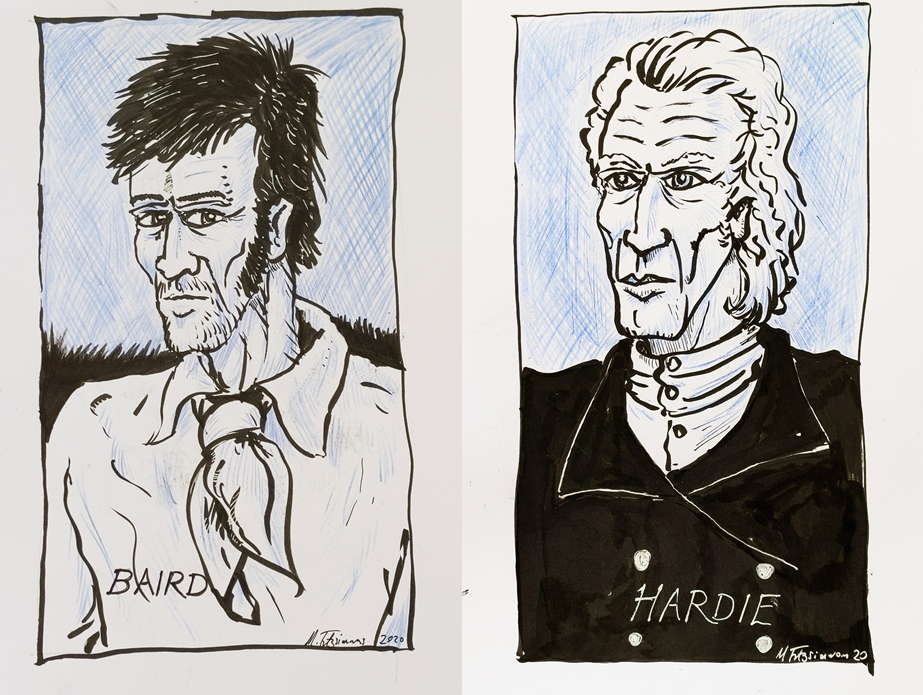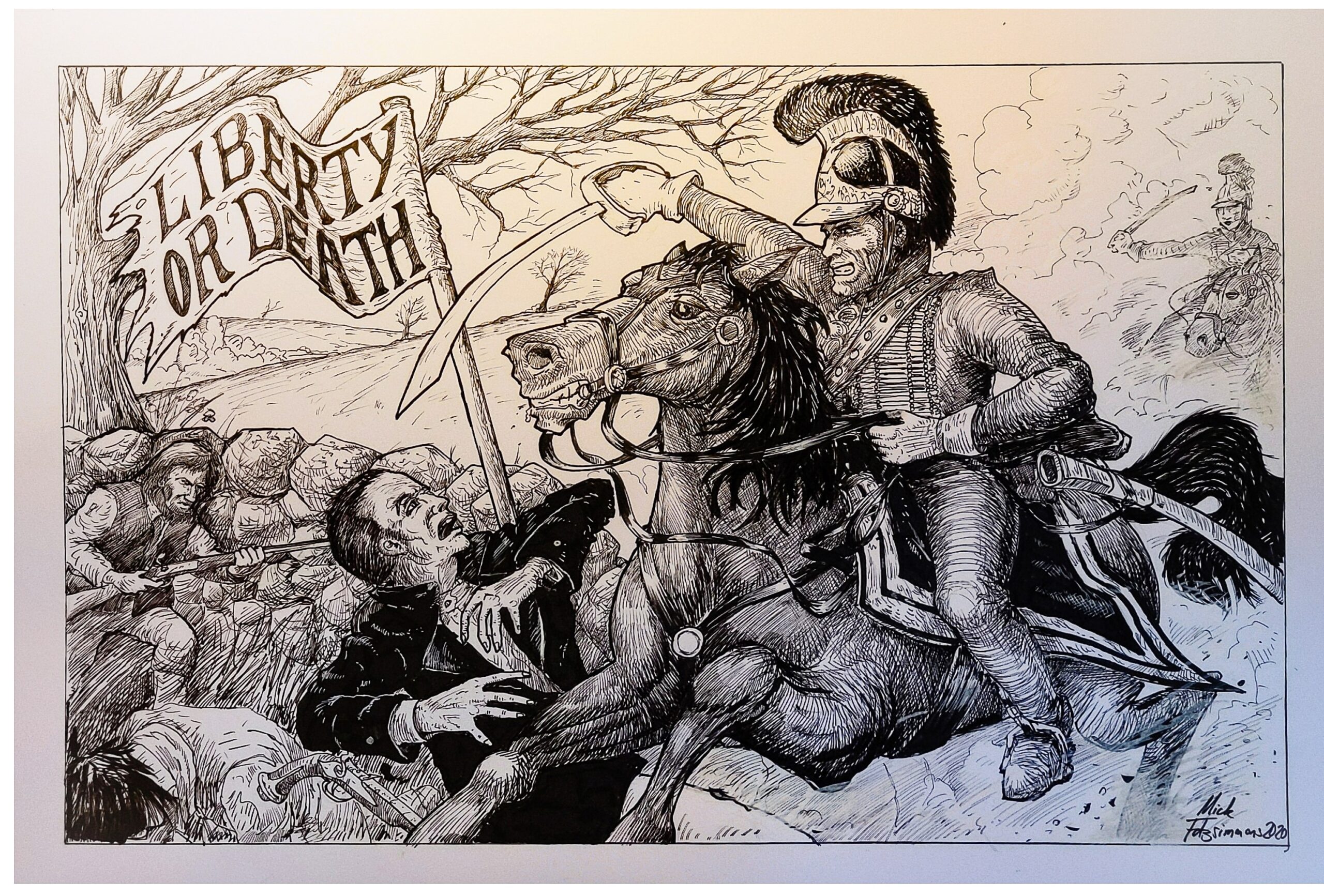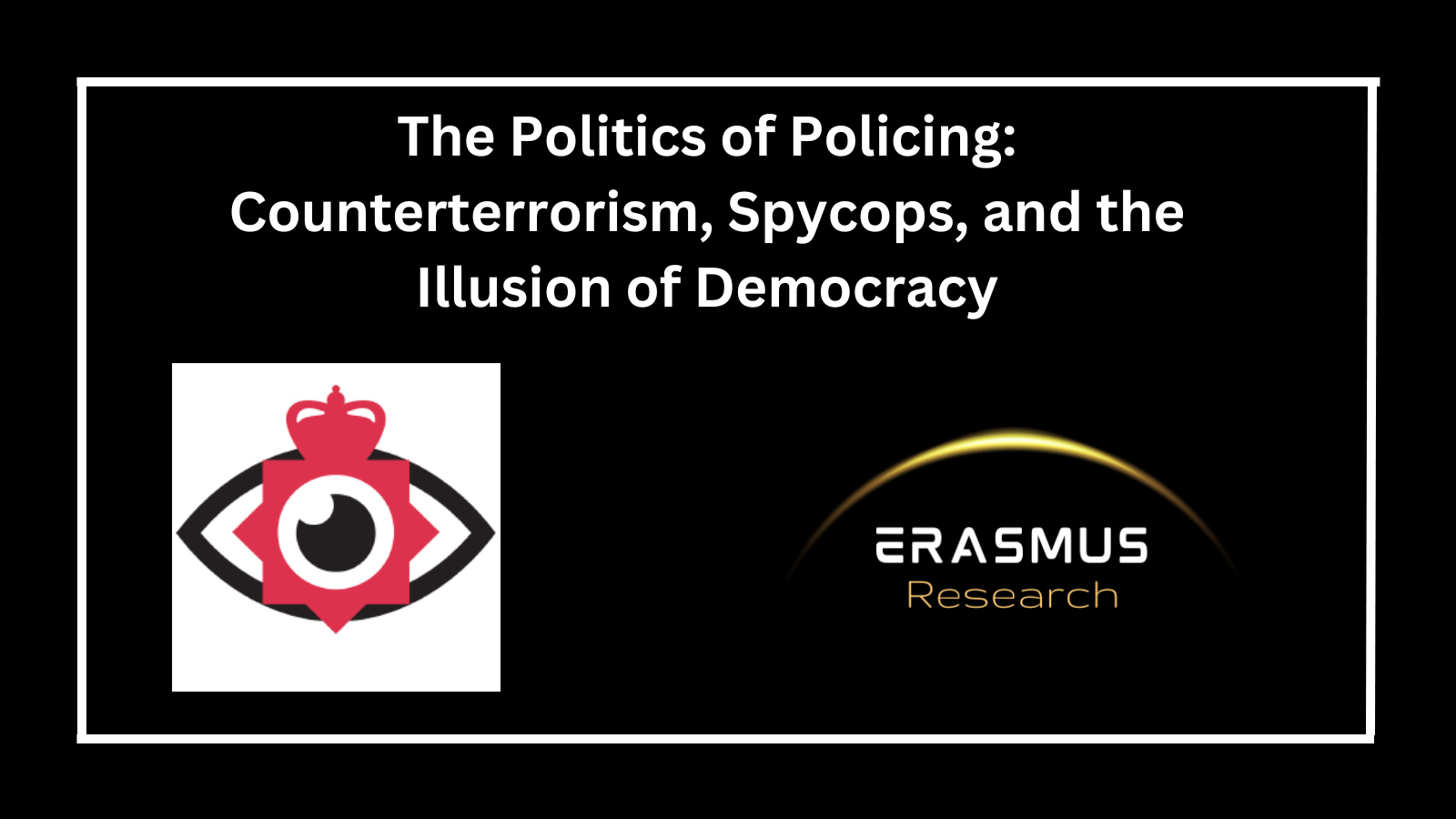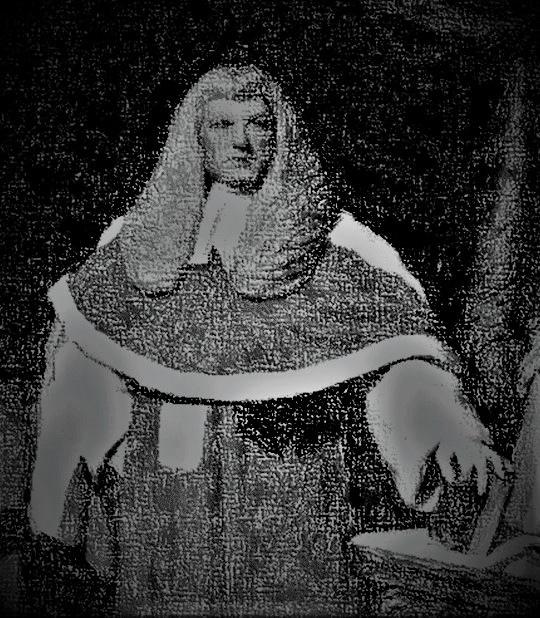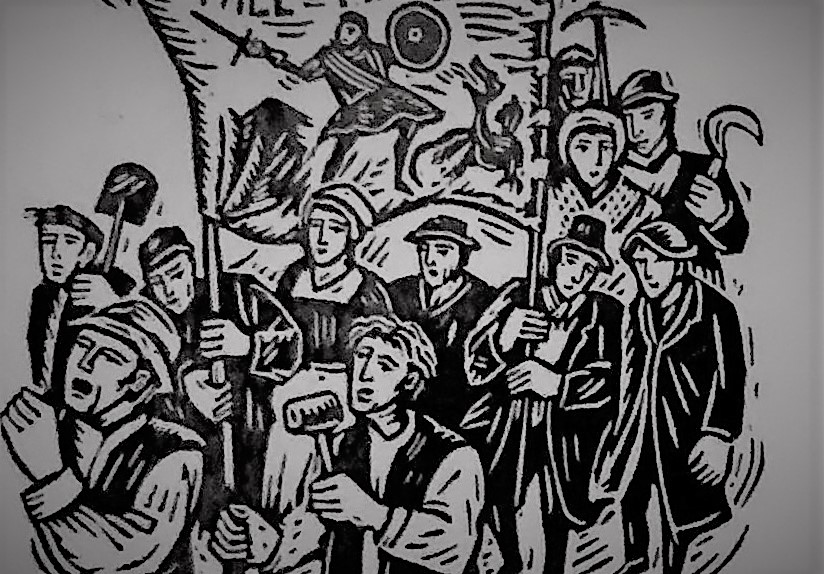This is the first section of Chapter V of the serialisation, the wording reproduced exactly as it appeared in the Stirling Sentinel, on Tuesday 12th March 1889.
CHAPTER V
GLASGOW UNDER MARTIAL LAW – HOW THE RADICALS WERE DUPED BY GOVERNMENT SPIES – PROPOSED ATTACK UPON CARRON IRONWORKS – JOHN BAIRD AT HOME – VISIT OF A SPY – HE SLEEPS IN HIS VICTIM’S BED -THE RADICALS ARMY IN GLASGOW – ANDREW HARDIE SELECTED AS LEADER – A SPLIT IN THE CAMP – THE NIGHT MARCH TO CONDORRET – THE COUNTERMARCH OF THE GOVERNMENT FROM STIRLING.
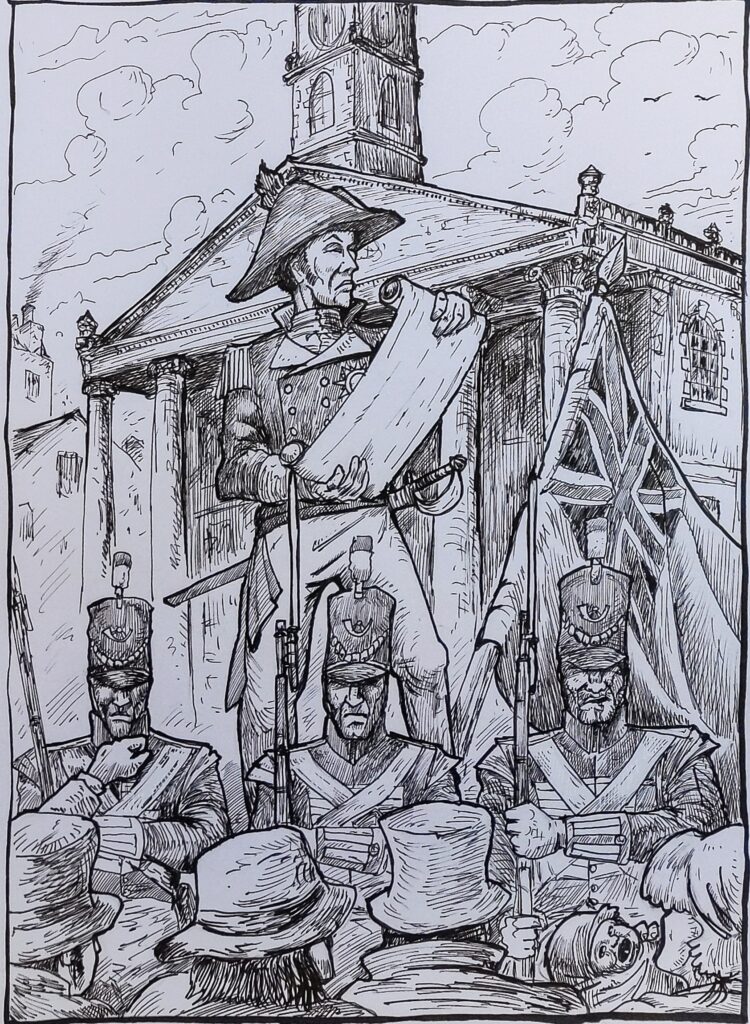
The Radical History Project illustrator is Mick Fitzsimmons. Click on the image to visit Mick’s Instagram page, where you can contact him for A3 prints of the illustrations that accompany this serialisation.
It is necessary in dealing with the events of the three days which followed that memorable Sunday, the 2nd of April, 1820, to observe, somewhat strictly, their chronological order, so that our readers may see how they led up to the fatal climax at Bonnymuir. On Monday the 3rd all work was suspended in Glasgow, and great precautions were taken against the rebels who were supposed to be preparing to take the place by storm. The banks and public offices were guarded by soldiers with fixed bayonets, and the very churches had troops within their sacred precincts. The Council Chamber and Jail were surrounded with soldiers to protect the civil powers and keep the prisoners from rising in tumult.
Artillery was planted on each side of the river Clyde to guard the bridges, the report being that the Paisley Radicals, 10,000 strong, with their pikes and clegs were marching on the city. In the Royal Bank, where the city treasures were stored, a company of sharpshooters with twenty rounds of ball cartridges in their cartouches was drawn up,, and according to Peter Mackenzie, who was a witness to the scene, ladies and gentlemen were actually sobbing and crying and wringing their hands, and rushing to the bank to take farewell through its iron pillars of some of its devoted inmates, ere they should be slaughtered. When it was announced that the mail coach from London, which everyone feared had been stopped on the road by the rebels, had safely arrived at the Tontine Hotel, near the Cross, three loud cheers were instantaneously sent up affording great relief to agonised parents, sweethearts, and wives.
Meanwhile, let us see what was going on in the Radical Camp, the cause of all this consternation. Turner the spy appears on this Monday morning the 3rd to have intimated to his unsuspecting dupes, the Radical weavers of Glasgow, that the first operation in the plan of campaign was an attack on the Carron Ironworks, where, he said, a quantity of cannon would be found, and where the whole workmen would be ready to receive the attacking party with open arms. It is a significant fact, as tending to show prearrangement with the authorities, that the Carron Company had received a hint that the Radicals from Glasgow were going to march upon them and seize their cannon, and two or three companies of the 18th regiment of foot were marched to Carron and encamped within the company’s gates.
On the same Monday night, Craig, another of the gang of spies, mustered a party of about thirty Radicals on the Sauchiehall Road, a little to the west of Anderston. They were armed with pikes and other weapons chiefly furnished to them by Craig himself. He harangued them in favour of the Treasonable Address, copies of which he distributed among them, and after drilling the party for some time, he proposed that they should march in military order to the banks of the Canal, there to join another party on their route to Carron. Craig, assuming the leadership, proceeded for some distance, but bye-and-bye he managed to slip behind, and breaking a lamp near a police station, he was apprehended.
The party, having lost their leader, very prudently separated and went home, for if they had marched a few yards further, near to Port-Dundas toll, they would have found a party of hussars waiting to intercept them and to bring them back to Glasgow as State prisoners taken in an overt act of high treason. There can be no question that these men were being led into a trap by Craig, who was taken before a magistrate the next morning, fined and discharged without being called on to pay a shilling of the fine. This dastardly scheme of entrapping the poor dupes of the spies failed on the Monday, but unhappily succeeded only too well at Bonnymuir two days afterwards.
On the forenoon of Tuesday, 4th April, an effort was made in another quarter of the city to get up a fresh party to march to Carron. A man named Flannagan, who was mixed up in the business gives the following account of what was done – “We met Turner [a spy] in the Green that forenoon (Tuesday), when we were informed of news of a disastrous nature were received from England; that Leeds, Halifax and Huddersfield had withdrawn; and that Manchester and other places were afraid to act without our cooperation in Glasgow, that Carlisle, on hearing what had taken place in Glasgow, had struck work also, and was waiting to see what we would do. However, if we struck the first blow, Manchester and Carlisle, he said, would begin also. If not, they could and durst not attempt anything. He therefore requested that we immediately go and consult the Unions how they were determined to act, and to meet him (Turner) at the same place at 4 o’clock in the afternoon.
We then went and informed the Unions whom we found assembled at the corner of the High Churchyard, called the Alley. William Maltman delivered Turner’s report to the Unions for consideration. I was elected for Castle Street Union. We met Turner again at 4 o’clock. The delegates reported that about one half of the Unions were ready to act, at which Turner seemed highly pleased, and informed us that the Secret Committee had received more favourable news than in the morning; that England was determined to act independent of us and he requested us to return and inform our Union to hold themselves in readiness at a moment’s warning – to meet him that night at 8 o’clock, opposite the Roman Catholic school, Clyde Street, where he would have further information to communicate from the Secret Committee.
We accordingly met Turner at the appointed place, viz., opposite the Roman Catholic Chapel, at 8 o’clock, when it was proposed that we should retire to a field near Port Eglinton. This we did. The rain was falling in torrents. Turner then informed us that the blow was actually struck in England, that we might rely the Carlisle coach or mail would not arrive next morning, which would be the signal for us to begin – that he wanted about one hundred men from our Union to accompany one hundred more, I think, from Anderston, to go to Carron to secure a large quantity of arms and ammunition, and two pieces of cannon; that sufficient refreshments would be provided for them, by the way and that they might rely that they would not see a military man until they returned. He (Turner) then addressed every individual in turn – how many men he thought he could produce? – when finding he could rely on about 100 volunteers, he told them to go and inform their Unions, or those that would turn out, to repair immediately to Germiston Road, where he would meet them and deliver his orders.
This statement of Flannigan’s, the accuracy of which has not been called into question, is a very important one. It proves that the Secret Committee was completely composed of Government agents or spies and did not include a single honest weaver. In the second place the freedom of movement in a city under martial law, with an army of occupation 6000 strong, shows that these spies in marshalling, drilling and ordering of the Radicals were doing so with the connivance of the government and local authorities. It is obvious that if, after all the alarm that had been created, there had been no armed expedition anywhere, the Government would have been discredited and the Magistrates of Glasgow laughed at. Hence it was necessary that some of the Radicals should be taken in arms, and we see how anxious and persistent the spies were in their efforts to bring about this result. Lastly, Flannagan’s story clearly proves that up to this point Andrew Hardie, however strong his sympathies might have been with the Radicals, had taken no active or prominent part in their proceedings.
Leaving for a little the band brought together under arms at night by the machinations of Turner, let us trace the movements of another of the spies, whom we have met before – John King, who took so much interest in the circulation of the Treasonable Address. On the afternoon of Tuesday 4th April, the Secret Committee, of which King was a member, planned two missions to the country. One of these was to the veteran Radical, James Wilson, at Strathaven. The other was to John Baird, weaver, at Condorret in Dumbartonshire. With Wilson, who also forfeited his life in the Radical cause, we have no concern; but Baird was the hapless companion of Hardie on the scaffold at Stirling, and he demands our particular attention. He was an entire stranger to Hardie at this time; their acquaintance was fated to be a very short and painful one. A young man of good character, he was known to be a strong Radical Reformer, and was probably marked out as a suitable victim to offer up to a frenzied and panic-stricken country. It is said that Baird was in the Stirlingshire Militia, and was billeted on the famous Thomas Chalmers (father of the famous Stirling bellman) when the regiment was called up for training, but we can find no authority for this statement, and we are inclined to think it is erroneous, although there is reason to believe that Baird and Chalmers were acquainted with each other.
To be continued…
The second part of this chapter will be published online on Thursday 30th April.


